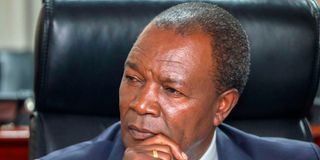Finance Act: Treasury CS Njuguna Ndun'gu bid to lift freeze order flops at appellate court

National Treasury Cabinet Secretary Prof Njuguna Ndung'u.
The Court of Appeal has declined to temporarily lift an order suspending the implementation of the Finance Act, as sought by Treasury CS Prof Njuguna Ndung’u.
Instead, a bench of three judges of the court said they will rule on the application by Prof Ndung’u, who argued that the suspension of the Act was affecting government operations, on July 28.
The CS moved to the appellate through Attorney General Justin Muturi arguing that the government stands to lose approximately Sh211 billion in the current Financial Year; a move that would make it difficult for the Kenya Kwanza administration to implement the 2023/24 budget as planned. Prof Ndung’u further said some projects have to be suspended in teh circumstances.
“The government of Kenya has to borrow to bridge the gap in order to operate. As there are no saving provisions in the Finance Act, 2023, the repealed provisions of the Finance Act 2022 has the effect of affecting revenue collection leading to service disruptions for already budgeted revenue,” Prof Ndung’u said in an affidavit.
High Court judge Mugure Thande stopped the Treasury from implementing the Act on June 30, 2023, after ruling that Kenyans might be subjected to unlawful taxes, in case the petitions challenging the Act are successful.
The judge later, on July 10 declined to lift the suspension and directed the file to be transmitted the file to the Chief Justice Martha Koome for appointment of a bench to determine the petitions challenging the Act.
Justice Koome has already picked High Court judges David Majanja, Christine Meoli and Lawrence Mugambi to determine the cases.
Arguing before Justices Mohamed Warsame, Kathurima M’Inoti and Hellen Omondi, former Attorney General Githu Muigai, who is leading a team picked by Mr Muturi, submitted that the suspension will make the government incapable of meeting its financial commitments and discharging its executive authority.
Prof Muigai said the fiscal plan has been disrupted as the forgone collections has to be factored in the expenditure and projects that would go unfunded.
He said the suspension of the Act, collaterally suspends the Appropriation Act at both county and national levels and the suspension affects debt service and access to consolidated services.
“The government of Kenya has to borrow to bridge the gap in order to operate. As there are no saving provisions in the Finance Act, 2023, the repealed provisions of the Finance Act 2022 has the effect of affecting revenue collection leading to service disruptions for already budgeted revenue,” Prof Ndung’u said in an affidavit.
Speaker of the National Assembly Moses Wetang’ula also supported the application for lifting of the order.
The application was opposed by the petitioners including Busia senator Okiya Omtatah who argued that the Appropriation Act, 2023, which is supposed to implement the budget, does not contain estimates of revenue.
Mr Omtatah informed the court that the Sh211 billion being ‘dangled’ by the CS was a fictitious figure meant to mislead the court. “I aver that in what is akin to a magician pulling a rabbit out of his hat, the deponent does not show wherefrom in the Appropriation Act, 2023, he got the figure,” he said.
The senator said unless the estimates of revenue to be realised to finance estimates are included in the Appropriation Act, there is no objective way of determining the purported loss of revenue.
“The measures for collecting taxes, which are contained in Finance Act, 2023 can only be constitutional and lawful where they are used to raise revenues which are approved in the Appropriation Act, 2023 to finance expenditure estimates,” he said.
Mr Omtatah further submitted that the appeal by the government is not arguable appeal because the High Court has not made a final decision in the matter.
He said as framed, the appeal or intended appeal by Treasury will require the court to determine matters that are pending in the High Court, and that would bind and frustrate the proceedings in the lower court.





